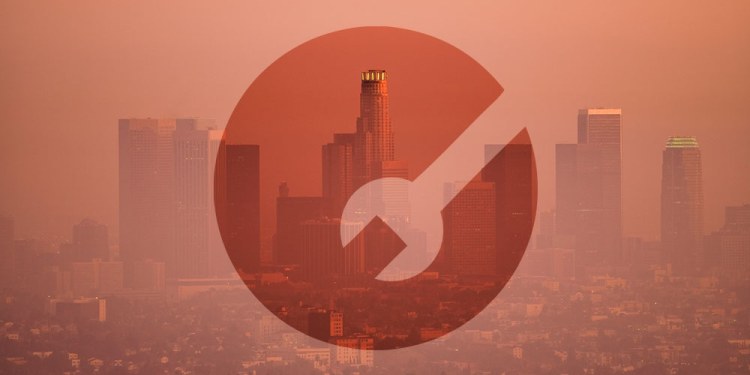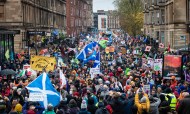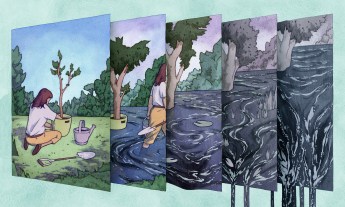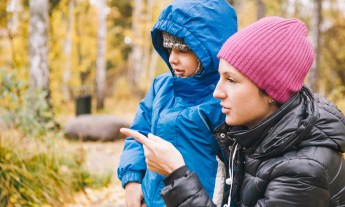

It’s tempting to argue about climate change — but this fascinating dialogue suggests that sometimes, the debate is just not worth your time. Climate expert Vicki Arroyo and risk analyst Dan Kahan discuss.
Vicki Arroyo: You’ve been working in Florida recently and that makes me wonder: Can you tell me a little bit about what you’ve learned about how to approach communities and even individuals who could be at risk from climate change?
Dan Kahan: The remarkable thing about Florida is that they’ve been having a conversation about climate change since it was created. I guess Ponce de Leon made the mistake of building Disneyland on a swamp when he didn’t find the fountain of youth, but path dependence being what it is, they’ve had to deal with a very inhospitable climate ever since. It’s just a part of their life and it’s woven into the whole culture and mode of government. So if you look at the materials their university scientists and land-use planners have prepared to address climate impacts today, they’re talking about exactly the same threats — coastal flooding, saltwater intrusion into their aquifers — that state university scientists and local planners were tackling in the 1960s.
Florida has also made a tremendous investment in acquiring scientific knowledge about the climate challenges that shape their existence — and what they can do to contain them. That means the rest of the United States is now getting the benefit of that knowhow from Florida. A good number of their university scientists were contributors to the forthcoming National Climate Assessment.
We’ve been working with the four counties of the Southeast Florida Climate Compact to coordinate their efforts to deal with climate impacts. Three of the four counties had Republican mayors when they convened their 2013 summit. Two weeks ago, Palm Beach’s County Commission — four Democrats and three Republicans — unanimously ratified the Compact’s regional action plan, which includes 100 measures relating to adaptation and mitigation. What’s interesting is that everybody is for this; this is business as usual for them. And that’s something I think people should realize. The question of how we deal with this as a community is not a polarizing debate. It’s a difficult debate, people have different stakes and interests, but they all have the same goal, which is to continue to live the way they want to in this challenging environment.
VA: Do you see them being able to pivot from a conversation about the impacts that might be — or are being — exacerbated by climate change to a discussion about how to solve the underlying causes? Do you talk about how to change your lifestyle or the way you’ve built your environment to reduce emissions?
DK: That certainly is part of the conversation, and I don’t know that a sharp line is drawn between adaptation and mitigation. But if you’re talking about what to do, they talk about things that will actually make their lives better, things like relocating coastal roadways, protecting their water supply, hardening public structures like hospitals and firehouses.
But I think the idea that adaptation and mitigation are somehow separate from each other is really very strange.
Talking about adaptation at the local level, talking about climate science as it relates to your life, is not an alternative to engaging the issue at the national level. I mean, there’s a really wicked constraint on engaging climate science at the national level. Nothing happens. So how do you overcome the entrenched political economy that constrains policy making at the national level? Well, one way is to activate demand at the local level. The needs of these communities exceed the resources they have available to them, yet the things that communities from Florida to Louisiana to the Carolinas to Texas to Arizona to Colorado to California have in common are really extraordinary. If they were part of a coalition, that could really break the back of the political economy that’s currently constraining national climate change policymaking.
VA: We’re certainly also seeing broad interest in assistance from communities coast to coast, from Alaska to Florida, from south Louisiana up to the Northeast. Much of our work at the Georgetown Climate Center is domestic, so we’ve had requests for help sifting through how to change ordinances, policies or laws, or how states can use federal funds or state programs more creatively with climate change in mind, and whether or not they’re going to be allowed to use their money differently without getting stuck in bureaucratic red tape. We’re getting more requests than we can deal with.
On the other hand, while we’re doing that really applied work, we’re also trying to share some of those lessons with other jurisdictions through tool kits and our Adaptation Clearinghouse. We’re working in parallel with the White House Task Force on Preparedness and Resilience, where they are engaging state, local, and tribal leaders. We’re facilitating federal, state and local dialogue around disaster response, promoting living shorelines, and water infrastructure, to figure out the obstacles that people have faced in making changes on the ground. Sometimes there have been federal regulations, laws — or the interpretation of those laws and policies — that might need to be changed in order to streamline the local community’s ability to make investments with climate change in mind.
At the same time, I’m really struck by how you can still travel on a plane in this country, and sit next to a sophisticated person like a doctor or an engineer with a background in science, and they see you reading something about climate change, and you end up in an argument. This happened to me recently.
A medical doctor saw the book I was reading on climate change and insurance and started engaging in an argument with me.
He made a crack, like, “Oh, is that book written by Al Gore?” And then he attacked Al Gore, attacked me, attacked climate change as a belief system. I’m not a social scientist, and I struggle to have that conversation with people. So — is it even important to engage in conversation with skeptics, or do we just work with policymakers and avoid what often turn out to be dead-end debates?
DK: People often come to me and ask, ‘How do I have a debate with a skeptic?’ And really, I’m not a debate coach. I’m also not a psychoanalyst. I don’t know exactly why you want to put yourself in a position of having that kind of conversation. It really is akin to debate competition in high school. These people are extremely motivated to make points; if you’re extremely motivated to engage them back, fine, but you’re playing a game of sorts there. And maybe that’s fine too, but don’t get confused. Don’t think that the conversation you’re having with somebody who has that level of interest in the issue and that level of commitment to a position is actually very much connected to promoting a national conversation or a constructive posture of engagement with climate science as a policymaking matter. The lesson is, the positions people are taking on this issue are not a reflection of how much knowledge they have about the science. They are an expression of their identity. So when you ask people, ‘what do you think about climate?’ they answer with, ‘I’m a Republican, I’m a Democrat, I’m this kind of person, I’m that kind of person.’ As long as that’s the case, you’re not going to get anywhere just by trying to promote more knowledge.
VA: I know that some of the work suggests that it’s more important for people to hear from people in their communities whom they respect, or from military leaders who can speak to the fact that we are more at risk because of our oil dependence, or from ministers who can talk about our duty to be stewards of God’s creations. But for those of us who are not ministers or in the military but who do speak to these issues, is it worth trying to find ways to connect with an audience first as a person?
DK: I think that people have the wrong model if they think that improving the prospects for constructive policy engagement with climate science involves having lots of conversations with people and trying to make them accept certain kinds of propositions from science. If climate change continues to mean “Who are you?” then it’s going to continue to polarize people, and it’s not going to be an issue of information. The meaning has to change. And changing the meaning isn’t so much about having these conversations. But if you’re talking to people who are curious and who want to learn things about climate, then the last thing you want to do is to try to tie it to the kinds of political identity issues that cause the conflict in the first place. You know, people are curious. Museums or places that are sites of informal education are places where people can find out a tremendous amount of climate science, because it’s fascinating. So exploit the kind of appetite people have to try to know something they didn’t know. It won’t matter whether someone’s a Republican or a Democrat. If you’re using the craft of science communication in the right way, they’re going to take in a lot. Of course, whether they walk out saying, ‘now I believe in climate change!’ I don’t know.
VA: I guess I’m struggling with the fact that I’ve been working on climate policy now for a couple of decades. I lived through the wars over the big climate bills. McCain-Lieberman was an early one, but much later Waxman-Markey. When that failed in 2010, it really felt like the legislation didn’t just fail in the same way that the Clean Air Act reauthorization failed one year and then would be picked up again the next year to work through the system later (to be passed eventually in 1990). It seemed that when the comprehensive climate bill failed, you almost couldn’t speak about climate change anymore.
I think that’s why people who work on the front lines of policy here in the nation’s capital, both at a federal level but also as we do at the nexus of state and federal policy, are really struggling. People in the offices of Congress say they don’t want to take up this issue because it’s a no-win issue, because it might be linked to something like higher energy prices at home. And by the way, they don’t hear about it from their constituents, who aren’t complaining about it during their town hall forums, and if their constituents don’t see a link between emissions and climate change, why would they take this legislation up? I think that’s why policy people are increasingly concerned about how to talk about this in a way that really gets people’s attention — that really reaches people where they live and makes these connections.
DK: But there are a lot of mechanisms in between. I don’t think the main constraint on policy is what ordinary people are saying when you’re talking to them about climate. I find it puzzling that people think that the root to getting congressional action is having a social movement. Social movements are inherently conflictual, and that’s what’s causing the problem with climate change. If you could minimize that, if you didn’t have people attaching such significance to positions on this issue, it’d probably be a lot easier for Congress to do something. For instance, Congress passed legislation in 2010 on the standards for formaldehyde in pressed wood. They did this because people in the FEMA trailers after Katrina were getting poisoned, and it was bipartisan. You know, it was 2010. Bob Inglis voted for that, I think.
His constituents weren’t on the phone telling him to do something about pressed wood and formaldehyde. They put him into office because they trusted him.
He had their values, and he figured out what makes sense and does it. But he got knocked out of Congress when he said he believed in climate change. When you take a position on climate change, it’s viewed as something that defines you. That is not a good situation for climate change to be in. If you want to improve the political prospects, get rid of that.
VA: But then, Americans have a high degree of trust in what scientists say, yet only half of them think that scientists are in broad agreement that climate change is human-caused. That’s a gap in information, given that we know that 97% of scientists agree that climate change is linked with human causes.
DK: But it can’t be a gap in information. There’s a study that shows that, on average, a study has been produced every 18 months for the last 10 years, that has been the subject of tremendous social marketing campaigns. Gore’s group spent $300 million, and that stat was the centerpiece of it. When you show people that information in the real world, they accept it or reject it depending on their cultural outlook. The problem isn’t that they’re not getting the information. It’s that they’re rejecting it because they understand full well what the social meaning is of adopting the conclusion of the people pushing that into their face.
VA: Not only the social meaning, but the social consequences that it might mean — that they believe they might have to drive a smaller car, say. At least, that’s what they think, that this is about taking away their SUV — as the doctor I was talking to on the plane said. He drove a Hummer.
DK: Maybe, but the effect is going to be just as big on Democrats as it is on Republicans. And in fact, the position you take on climate change as an individual doesn’t have any impact on what the policy is. It has a big impact on your own experience, as that unpleasant conversation you had with the doctor revealed. But people rationally adopt a position that avoids a situation where they might be at odds with people who are important in their lives. It doesn’t matter what position they take if they’re thinking about what kind of car to drive. Their own positions on that don’t have any impact. In aggregate they do, but the positions they take reflect what it’s like when they, in their everyday lives, have a position on climate change, and how other people have now come to see that as a symbol of what group they’re in and whether they’re loyal to it.
VA: So how do we get past this? I mean, we have to prepare. People are vulnerable and they’re going to continue to be vulnerable. They might have to make some significant changes — like retreat from land that’s not going to be there in 50 years. That’s a conversation we need to have. Is it better to just not talk about the sources of climate change and focus on the fact that seas are rising or storms are becoming more extreme?
DK: It’s not a question of what magic code words or language you use, it’s a question of what you’re really discussing. In those kinds of places, it’s a practical issue: how should we live? And it’s a practical discussion among people who have a common objective, which is to have a life that is comparable to the one that they’ve had, probably for generations. Then it doesn’t matter whether they’re red or blue or whatever. They talk about it, they all have a stake in it, they’re used to it, and they trust each other because they can see that they all have the same relation to it. Those conversations are happening. What you don’t want to happen is for those conversations to become infected with the same kind of polarizing significations by which climate change as a national policy issue is characterized. And what you really don’t want are people who aren’t parts of those conversations and aren’t parts of those communities to come in and tell people, ‘oh, your conversation is about this.’ That really is counterproductive.
VA: So how do you deal with that as a Yale professor who is helping Southeast Florida?
DK: Well, I’m not communicating with anybody! In Florida, we basically offer services to the members of the Compact to help them collect evidence that they think is relevant to understanding what people in their community are concerned about and how to communicate what the Compact is about better to them. But we’re not communicating and we’re not telling them what to say, and the most effective thing to communicate is that people like them are actually oriented towards climate science in a positive way. That’s how they figure out what the valid science is on everything. And that’s the information that’s missing on climate change — not a bunch of facts about science, but actual, tangible, believable, credible cues that people in all walks of life — homeowner association officials, realtors and developers, representatives of the tourism and agricultural industries — are all engaging this science in a way that’s positive, because their practical decisionmaking is affected by it.
VA: Speaking as somebody who is from south Louisiana and as someone whose family has lived through — and had losses during — Hurricane Betsy, Hurricane Ivan, Hurricane Katrina … Even with that history, the future will be different. As difficult as it may have been in previous generations, climate change does inform and drive some of our current and future challenges. That’s one of the many risks facing south Louisiana. People are really grappling with decisions about where to relocate or whether or not they should rebuild in a particular place or manner. They should be informed about anticipated future impacts, or else they will be even more vulnerable in the future.
DK: Promoting more effective public engagement with climate science so people can actually take steps in their everyday lives to make themselves more secure is a critical moral imperative. Nothing the United States does, including if it stopped emitting any carbon tomorrow, is going to change the fact that these people are going to face severe impacts for the foreseeable future. So they’ve got to try to engage that issue and do something about it, no matter what else we do. But the truth is, if they are doing that, if people all over the country are talking about how to use climate science to improve our lives, you are changing the culture and you’re changing the political economy in a way that creates a realistic prospect for national policy-making that’s informed by climate science.
If you keep screaming in people’s faces in a way that says ‘us’ versus ‘them,’ you’re reinforcing the very kinds of dynamics that made it fatal for someone like Bob Inglis to become involved in the issue.
That made it so that somebody who knows the most basic facts about climate, that when you put carbon into the atmosphere it increases the temperature, will still say, “I don’t believe in climate change.” That pollution in our science communication environment is the thing that is most hostile to enlightened self-government, and if people want to work on that as a communication problem, that’s what they should put their attention on, and they should by no means add onto it. I’m afraid that a lot of what passes for climate advocacy does just that.
VA: I think we’ve already started to see some interesting parallels when it comes to climate mitigation, because some of the campaigns that have tried to attack, for example, EPA regulations coming out on carbon pollution, have generally not been successful. And that’s in part because of the experience on the ground in states that can be pretty conservative but also have tremendous wind or solar resources. They have constituents at home saying they’re benefiting from renewable energy. They’re farmers leasing land for wind or businesses leasing rooftops for solar panels. So I think this emphasis on local place-based engagement is right, and this confirms why our Center spends most of its time working with state and local governments. Even though I can see the Capitol out of my window, that’s really where the change needs to happen — in states and communities — and fortunately, it’s where change is happening.
DK: It is the case that communities all over the country need something to protect themselves from climate. Politicians’ constituents, including very influential ones, have a stake in this. There should be an effort to focus and coordinate the demand that they have so that Congressional delegations talk about this in a completely different way. Just going into Washington and having a debate about the science is not responsive to what people are really motivated by. We have to learn about the science needed to face our problems — and about how to govern ourselves in a way that enables us to get the full benefits of our scientific knowledge.
Trained in science, law and policy, Vicki Arroyo is the executive director of the Georgetown Climate Center, where she helps turn science into policies that help communities adapt to rising oceans and temperatures. At Yale Law, Dan Kahan examines how people perceive, argue about and make decisions about risk — and specifically climate risk. He studies public disagreement over climate change from a fresh perspective. This conversation was lightly edited.













